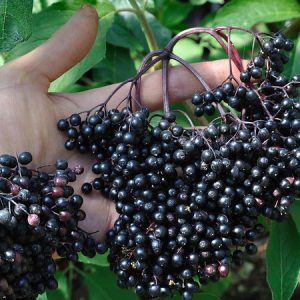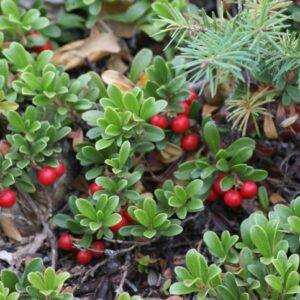Shipping of spring plants is now closed for the 2024 season! New orders will not be accepted.
All other items including merchandise and pantry items are still available for order online.
Showing all 5 results
‘Korsor’ Elderberry
$20.00Korsor is a variety of black European elder notable for its large, dark, juicy berries. It grows to about 8 feet tall. Bred in Demark.
European black elderberries are the most sought-after and productive elder species because they have been selected for heavy yields and cold hardiness. The berries are renowned as a nutritive anti-viral and immune system tonic. If you buy elderberries or elderberry tincture in the store, you are most likely looking at a variety of European black elder, Sambucus nigra. Flowers can also be harvested!
This species is partly self-fertile, so doesn’t require cross-pollination, but the yields will be heavier with a second variety planted nearby. Elder shrubs prefer partial shade to full sun, with higher yields in more sun. It’s best to irrigate them in summer. Netting may be required to keep birds from destroying berry crop.
American elderberries (Sambucus canadensis) are native to the Midwest US and are more vigorous than black European elderberries (Sambucus nigra). Both are planted commercially for medicinal berries. Our Kootenay native blue elderberry (S. cerulea) also make wonderful medicine, and they are more drought tolerant than other varieties. Don’t accidentally mistake red elderberries (S. racemosa) for any of the edible and medicinal varieties – they are not safe to consume.
Pre-order now to pick up from the farm this spring!
Select from available product options.
Black Currant
$16.00A handsome fruiting hedge. Extremely productive. Medium-sized fruit forms in clusters on this compact, upright bush. Fruit is high in vitamin C and can be eaten fresh, but is traditionally used for prized and popular preserves. Also ideal for juicing, wine, and fruit liqueurs. Plant tolerates shade. Cold-hardy. Ripens in June or July. Self-pollinating.
*Do not plant within 900 ft. of white pines due to the potential for Blister Rust.
Pre-order now to pick up from the farm this spring!
Select from available product options.
Available as : #01 potted
Kinnikinnick Bearberry
$16.00Hardy native mat-forming evergreen groundcover with small shiny foliage and pink, bell-shaped blooms in spring followed by red berries. Prefers a moist, well-drained soil. Drought tolerant once established. Kinnikinnick berries are edible but mealy and tasteless, but were an important traditional food source for some First Nations groups because of their persistence on branches throughout the winter. Due to their texture and lack of taste, the berries were usually processed, cooked, or preserved in some way. Young leaves can be used in tea as well.
Pre-order now to pick up from the farm this spring!
Select from available product options.
Available as: #01 Potted
Red Currant
$16.00Grow clusters of popular dark red berries! Attractive heavy-bearing bushes yield the tastiest currants you’ve ever savored. Berries hold well on the bush and are ideal for jellies, preserves, tarts, and muffins. Cold-hardy. Ripens in July. Self-pollinating.
*Do not plant within 900 ft. of white pines due to the potential for Blister Rust.
Pre-order now to pick up from the farm this spring!
Select from available product options.
Available as : #01 potted
White Currant
$16.00A natural mutation of the red currant varieties. Medium-sized fruit forms in clusters on this compact, upright bush. The small, round berries appear green to start but later transform into creamy shades of white and pink. Fruit is high in vitamin C and can be eaten fresh, but is traditionally used for prized and popular preserves. Plant tolerates shade. Cold-hardy. Ripens in June or July. Self-pollinating.
*Do not plant within 900 ft. of white pines due to the potential for Blister Rust.
Pre-order now to pick up from the farm this spring!
Select from available product options.
Available as: #01 potted








